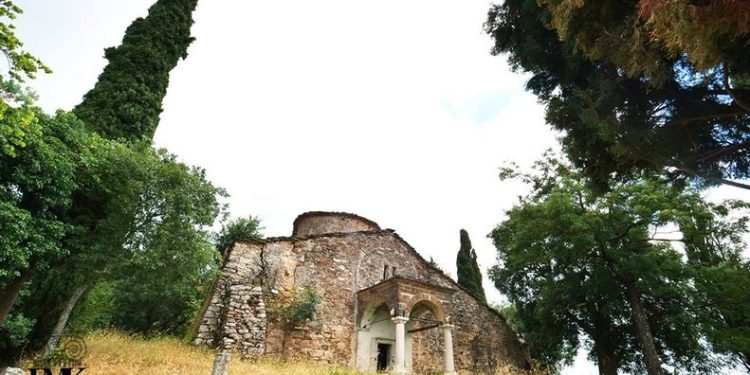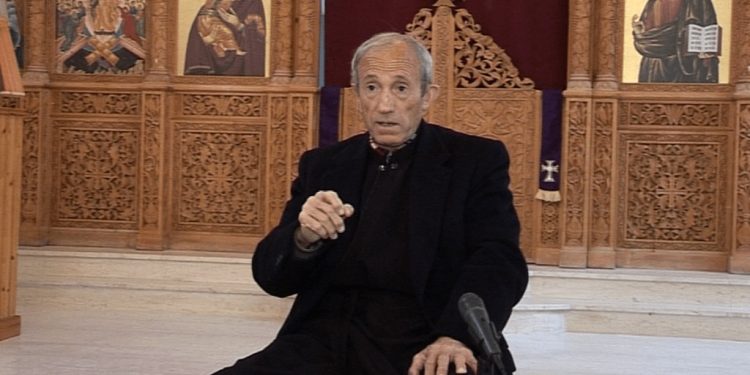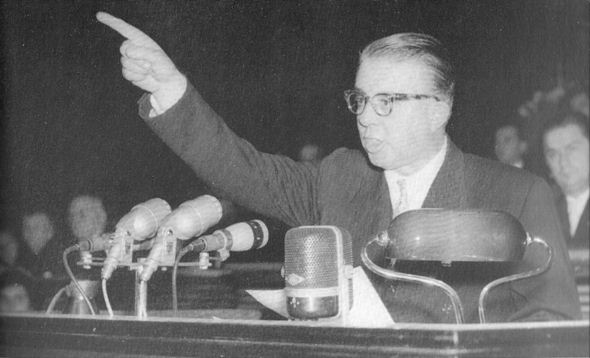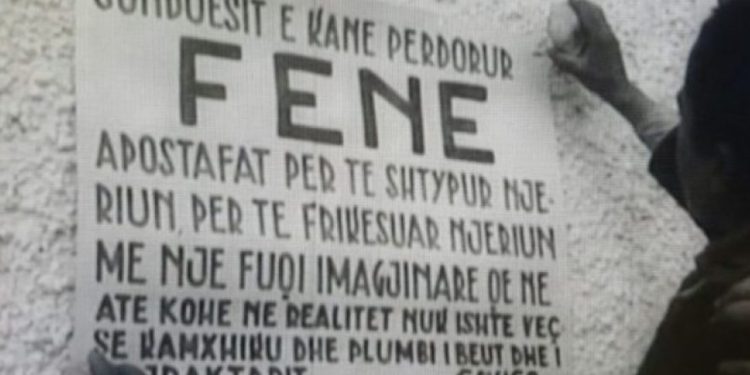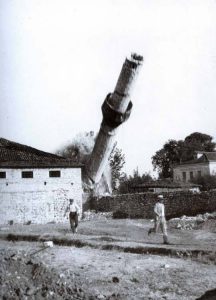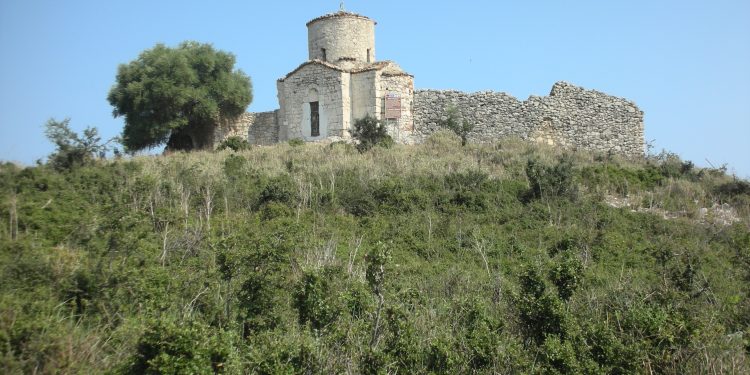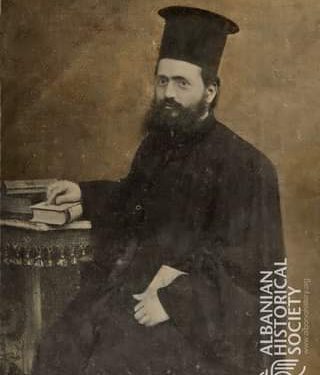By Fiqiri Sejdiaj
Memorie.al / Mihal Davidhi, from the village of Zhukë i Novosela in Vlora, in 1967, was 19 years old, when he took the courage and wrote a simple letter to the “great and glorious leader” of the Albanian people, Comrade Enver Hoxha. “Great, glorious…” everyone called Enver Hoxha at that time. However, this letter written with soul, in search of light, would be fatal for Mihal Davidhi. He sought light and found darkness. He “opened his heart” to the Party and it closed all the doors of life. He had lied badly. He had been deceived even worse by communist propaganda. He believed in the party’s slogan that; “anyone can write in capital letters what he thinks about work and people”.
After this slogan, young and old began to write to the party and Comrade Enver, regardless of whether they worked in a plant or factory, regardless of whether they worked in a farm or cooperative, regardless of whether they studied at school banks, or served in the army. Anyone could open their heart to the party and Comrade Enver.
From all four corners of Albania, people’s letters to the party and Comrade Enver, the Central Committee and the Presidium of the People’s Assembly poured in. So many letters were written by the people that such a thing turned into an epidemic. Many of these letters were published in the newspaper. For many others, endless comments were made. The most chosen ones were read publicly in factories, factories and schools.
At that time there was no television, but Radio-Tirana, the only one in Albania, was buzzing from morning to night reading the letters that the people wrote to the party. In the Central Committee, there was a special sector that read people’s letters. It was these people who carefully chose the letters that would be made public. It was these people who decided which letters would be passed on to the party committees in the districts for consideration, which ones were of no interest and would be thrown in the trash, without anyone seeing or reading them, and others they would pass on. State Security for verification.
These were black letters, letters “with pepper”, which sought to disturb the high leadership of the Party, therefore those who wrote them should be held accountable. Why they wrote this letter, how did they write it, who taught them, who they worked with, did they have a leader, and so on and so forth. While an entire army was working to encourage people to write letters, another army, twice as large, was working to sort these letters.
In this atmosphere, Mihal Davidhi realized that he was late to write his letter. In vain he had wrestled for whole nights with the dilemma of whether or not to write his letter. His parents were simple cooperators. They worked in agriculture. They had no education, but they were honest people. As such, they believed in God, they believed in Jesus Christ. They did such a thing with soul.
With faith in God, they also raised their six children, Mihal, his brother, as well as their four daughters. When he decided to write a letter to Enver Hoxha and the Presidium of the People’s Assembly, Mihali was 19 years old. It was 1967, when churches and mosques were being demolished all over Albania. It was the time when the Albanian youth, under the leadership of the party, with the teachings of Comrade Enver, was at the forefront of the action to eradicate from the foundations, these foci of obscurantism that poisoned people and drove them away from the party and its teachings.
Looking back to those distant years, Mihal Davidhi remembers: “We lived in a closed place. We were completely isolated and strangely remembered that we knew a lot, but we knew nothing. We thought we were rich, but in fact we were very poor. Our dream was to finish school. To be as orderly as possible in life and to become good cooperators. A lot of us became tractor drivers, drivers, and brigadiers.
At that time, for us from the province, it was not easy to get the green light. So, after I finished high school, I was drafted. I was in the district of Korça, in an artillery division with 192 cannons. There I heard on the radio the decision of the government, where by law, religious belief was prohibited in Albania. This was a very great pain for me, who believed in God.
Destroying all the churches and mosques, everything related to faith in God, for me this was absurd, a terrible decision. I was open. I would even say: We must oppose this. How is it possible to take God away from us?! Who should we trust? A leader! Yes, he is like us. The army had made me a man, developed me. I had read many books there, many different authors. So, I was more educated.
Meanwhile, in the cooperative, I saw that people worked for a piece of bread. I understood the isolation, the poverty, almost enslaving. What could be done next? After the New Year passed, there was no Christmas at that time. Nothing. You could even go to jail if you were caught celebrating Christmas. All January, I was thinking about what I could do. I didn’t see space, I didn’t see light.
I thought to myself that only God could help me. And why not write to the Party, Comrade Enver himself and the Presidium of the People’s Assembly? I am just a man, an orthodox, a young cooperative. If we who believed in God did not raise our voices, who would? I thought about this decision for a long time, processed it… and wrote a letter.
It was an open letter addressed to Enver Hoxha as the First Secretary of the Party and Presidium of the People’s Assembly, with Comrade Haxhi Lleshi as President. I thought that the party should review this decision. Why? Because without faith in God, what can we do? In addition, we cannot move forward as a nation, as a society, as a family without God.
To whom shall we turn, to whom shall we call God? For these questions, I wanted an explanation. For this letter I am writing to you, you can imprison me, you can kill me, you can do whatever you want, but no one escapes the final judgment, the judgment before God. In the end, with respect Mihal Thoma Davidhi. This was my open letter, an individual letter.
Mr. Davidhi, did you not consult with others, so that the letter, in addition to your signature, also had other signatures?
No, such a thing for that time was dangerous. If the party did not like this letter, then all the signatories would be treated as a group, even as an organized group. Not one person would be attacked, but the whole group, the families, yes.
However, I was convinced that my letter would be liked by the party, that it would open a controversy, but finally, the party would intervene, Comrade Enver himself, would say: “Stop a bit! This young man is probably right. Without thinking about it. The old people, our parents believed in God, and this boy educated by the party, thinks and suggests to the party, so that we don’t hurt our loved ones. Those who want to believe in God let them believe. Those who don’t want let them not believe.”
In this way, Enver Hoxha satisfied both parties. I became the hero of the day, because with my letter, I had helped the party. That’s what I thought then. After writing the letter, I put it in an envelope and left for Vlora. At this moment, the sister arrives.
– You wrote something secret, – she tells me. He asked to take my letter, but I refused. Mother also came. When he asked me, I said: – Nothing, my mother. I want to become a man, that’s all – without telling him what I had done.
Where did you post the letter, in the village?
No, there was no post office in the village. I went to Vlora. I posted the recommendation and was waiting. Of course they would answer me back. After a month passed, I realized that my letter was a dead call, a voice in the wilderness. She was a flower that sought to bloom in the frost, before spring came. That letter was destined to dry up in the frost of the regime.
However, I kept saying to myself: No, they will definitely come to ask me. They will even think of me, because I had not done anything bad to the people’s power, nor to my country, nor to society. Ah, could I be punished, simply because I had written a letter, where I expressed my views, as the party and Comrade Enver taught us?
Days passed and nothing was happening. One day the chairman of the Council calls me and says: “Listen Mihal! Our cooperative needs an electrician and we have thought of taking you to a course in Vlora to become an electrician. You are a family of communists, a family of martyrs, so this scholarship belongs to you. If you agree, make a written request.”
Enthusiastic about the trust they had in me, I immediately made the request in writing. I did not know that my letter to friend Enver was selected by the letter sector as a “black letter”. State Security, he used to work for him. The answer from the Operative of the area had gone all the way up, that Mihal Davidhi could not write such a letter, since his father is a communist. His brother is a martyr; even his mother’s brother is a martyr.
Mihali himself is an exemplary soldier in all directions. A man like Mihali cannot go against the party line. But those above, in the ministry, who went to work until the end, gave the order to verify the writing. The electrician course was a trick. State Security wanted my handwriting so they could compare the original with the letter.
Why should they do such a thing, when you had put your name?
I had put it, but they suspected that no one else had done it, since I came from a family of martyrs, of the war. The verification, if it was the same script, was more than normal for them. After verifying the writing, I was arrested.
What happened to you after you were arrested? Where did they take you?
They put me in isolation, in the Department of Internal Affairs. In a separate dungeon. There I realized that everything meant dictatorship and how difficult it was to face it. The faith in God that my parents had cultivated gave me motivation to stay. After three days, in the middle of the night, the police pick me up and confront me with the investigator. “You made the letter, but we want to know who taught you, which group you belong to, who you are connected with, who directs you”?!
When the investigator saw that I had nothing to say, that I had written the letter myself, under my own name, that I had no connection with any group, with any leader, not even with the American imperialists, nor with the Soviet revisionists, nor with the monarchs – the Greek fascists, as he alluded to, the investigator was outraged. “Why should we remove God by law? I told him. If someone wants to believe, let him believe”!
-“Either you will take out the group and the people who pushed you, or you will rot in prison”!, the investigator told me. If you ask for my death, praise God, here you have me, but I am not lying to you. Why do you make me lie? “Who inspired you?” asked the investigator. – Gospel, Bible, holy readings. “Today I am letting you go,” the investigator told me, “but other times, think carefully.”
After a few days, he interrogated me again, at night. He threw a cross and a book of Saint Cozmai on the table, which I had hidden in the balcony of the house in the village. The issue became even more complicated, as I risked 3 to 10 years in prison for agitation and propaganda.
Did you go to court?
No, I didn’t go to court. I decided to make self-sacrifice. I decided not to eat or drink. One day, two, three, four. On the fifth day, they came and said to me: “Why don’t you eat”? I wanted to die. I had no motivation to live anymore, but that was my weakness. On the sixth day, the district prosecutor comes to me. He was a man of power. He was in the General Directorate in Tirana, and then since he had given the right to a woman, Enver Hoxha had criticized him.
Justice party. So they removed him from Tirana and brought him to Vlora as a prosecutor. This was from my village, a friend of our family. It was clear that he wanted to save me. He didn’t want me to go to jail. This investigator comes to my dungeon, finds me lying on the floor and says: “Why aren’t you eating? Why do you go on hunger strike? Why do you want to die?! Continuing the conversation, he tells me: “I give my life for the party, for whom do you give your life?” By God, I said. – I am happy that a boy from Myzeqeja is brave, but let’s put this bravery at the disposal of the Party and Comrade Enver, and not for God. To fight you must become a man. To become a man, you must eat.”
With these words, he gave me courage. I made the cross and thanked God. I started eating bread. Fortunately, I had a prosecutor on my side, Spiron, a friend of our family, who wanted to help me, but without being understood by others, otherwise he would be punished himself, as an opponent of the party and popular power.
Spiro knew the laws well. He knew that the communist system, if it forgave, could only do so for a mentally ill person. But even these were put in psychiatry. I have never been sick. I’m not even today. He sent me to Tirana Prison. Compiled a long forensic report, indirectly letting me understand how I should behave.
I spent 3 months in Tirana Prison. There I met the political prisoners, as it were; Panajot Buzuku from Belahova e Delvina, who was convicted for attempted escape. He had created Delvina’s group, but he was discovered and put in prison. He taught me and directed me to do this and that.
“Be very careful because, even in here, there are spies and they put you in molds that you can’t get out of.” He also believed a lot in God. “Be smart, use some tactics.” Then he asked me: “Which is better for you, to be outside or to be inside?” I have been sentenced to 20 years in prison. 20 years will not give anything to society. Here you can die and not come out alive, while outside, you have the opportunity to do something useful”.
When I went to the commission, I did what my friend Panajoti had told me. Conclusion: “Mentally ill, that’s why he wrote that cursed letter.” That is, I was irresponsible for my actions. All this was taken care of by our family friend, the prosecutor of Vlora.
After that, were you released from prison?
No, they took me back to Vlora Prison. They kept me for some time, there was a second trial again, and from the end of December I was taken to a psychiatric hospital. For me this was a very high cost. I would undergo medication. I’m not a doctor, I’m an agronomist, but I learned something. Medications in psychiatry are injections that destroy all sugars in the blood and after that, switch to electroshock. I prayed to God to protect me and save me from this situation. After six months in the hospital, they brought me to court and concluded that; I was cured. That’s how I was released from the hospital and from prison.
Where did you go after you were released?
In the village, in Zhukë. There I found a very hostile atmosphere. They had isolated the family in time. The cost I paid for a letter was high, not only for health, but also from a moral point of view. After the democratic processes, I joined the church. My desire was to become a priest, but the canon of the church did not allow me to become a priest, as I had been married twice. Monsignor Anastasi, very much his happiness, appointed me economist at the academy of Shëna-Vlas.
After all this history, do you feel satisfied and happy?
Yes. When I wrote the letter, I was quite young. Today I am 70 years old. I see the grays of old age. I am preparing. I’m not perfect, but I try to be a good person. I put all my mental, physical and intellectual abilities at the service of the church and the academy. All the greenery you see around has my humble contribution. Communism was a great evil for all of us.
Long live that system, because it was not so easy to overthrow. Especially his mentality. Not to go back to what we said, I have a message. I also forgave those policemen who beat me. I forgave them and said God bless them too! Memorie.al




